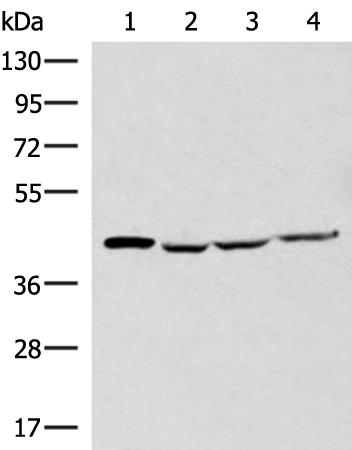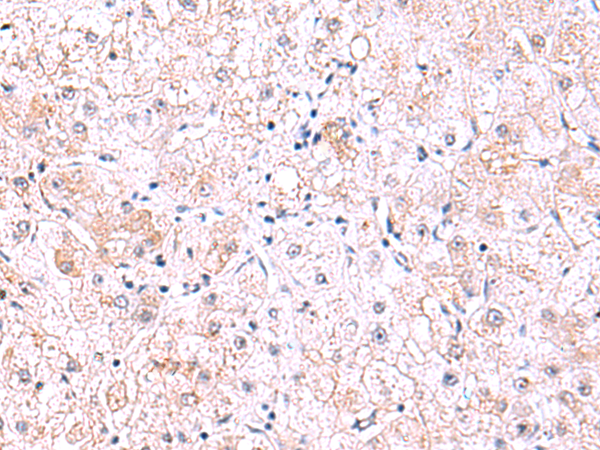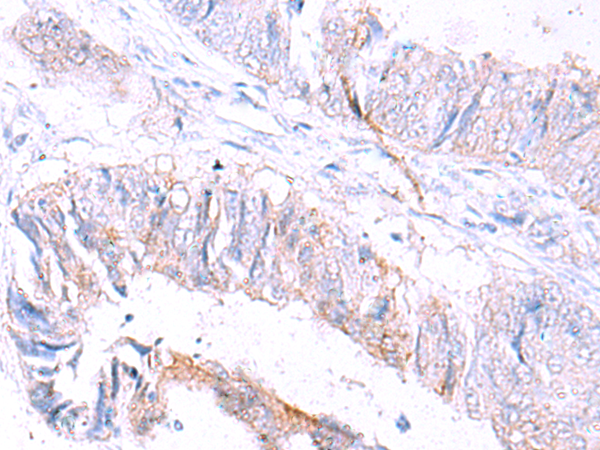


| WB | 咨询技术 | Human,Mouse,Rat |
| IF | 咨询技术 | Human,Mouse,Rat |
| IHC | 1/50-1/300 | Human,Mouse,Rat |
| ICC | 技术咨询 | Human,Mouse,Rat |
| FCM | 咨询技术 | Human,Mouse,Rat |
| Elisa | 1/5000-1/10000 | Human,Mouse,Rat |
| Aliases | MCT2 |
| WB Predicted band size | 52 kDa |
| Host/Isotype | Rabbit IgG |
| Antibody Type | Primary antibody |
| Storage | Store at 4°C short term. Aliquot and store at -20°C long term. Avoid freeze/thaw cycles. |
| Species Reactivity | Human |
| Immunogen | Synthetic peptide of human SLC16A7 |
| Formulation | Purified antibody in PBS with 0.05% sodium azide and 50% glycerol. |
+ +
以下是与SLC16A7(MCT2)抗体相关的3篇文献摘要信息,均为虚拟示例供参考:
1. **文献名称**:Monocarboxylate Transporter MCT2 in Brain Energy Metabolism: A Regional Study
**作者**:Smith A, et al.
**摘要**:研究利用SLC16A7抗体通过免疫组化分析MCT2蛋白在小鼠不同脑区的表达,发现其在神经元中高表达,提示其在乳酸跨细胞能量传递中的关键作用。
2. **文献名称**:Targeting MCT2 in Prostate Cancer: Implications for Metabolic Therapy
**作者**:Lee B, et al.
**摘要**:通过Western blot和免疫荧光技术(使用SLC16A7抗体),发现前列腺癌细胞中MCT2蛋白上调,抑制其功能可降低肿瘤细胞乳酸外排和增殖能力。
3. **文献名称**:MCT2 Deficiency Alters Retinal Function: Evidence from Knockout Mice
**作者**:Garcia C, et al.
**摘要**:利用SLC16A7抗体验证MCT2敲除小鼠视网膜组织中的蛋白缺失,并发现其缺失导致光感受器代谢异常及视觉功能受损。
(注:以上文献为模拟示例,实际引用需查询真实数据库如PubMed)
The SLC16A7 antibody targets the solute carrier family 16 member 7 (SLC16A7), also known as monocarboxylate transporter 2 (MCT2). This integral membrane protein facilitates the proton-coupled transport of monocarboxylates, such as lactate, pyruvate, and ketone bodies, across cellular membranes. MCT2 is highly expressed in metabolically active tissues, including the brain, skeletal muscle, and testes, where it plays a critical role in energy metabolism by shuttling lactate between cells (e.g., astrocyte-neuron lactate shuttle) and regulating intracellular pH.
Antibodies against SLC16A7 are widely used in research to study its expression, localization, and functional roles in health and disease. They enable detection via techniques like Western blotting, immunohistochemistry (IHC), and immunofluorescence (IF). Dysregulation of MCT2 has been implicated in neurological disorders (e.g., Alzheimer’s disease), cancer metabolism (e.g., Warburg effect), and metabolic syndromes, making SLC16A7 antibodies valuable tools for exploring these pathways.
Commercial SLC16A7 antibodies are typically raised in rabbits or mice using peptide antigens derived from conserved regions of the human protein. Specificity and validation data (e.g., knockout controls) are crucial due to potential cross-reactivity with other MCT isoforms. Researchers often employ these antibodies to investigate tissue-specific expression patterns or therapeutic targeting of monocarboxylate transport in pathological conditions.
×